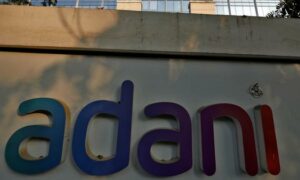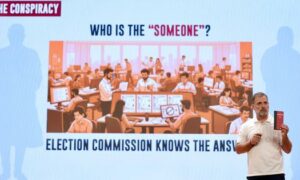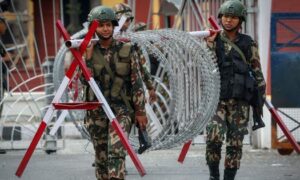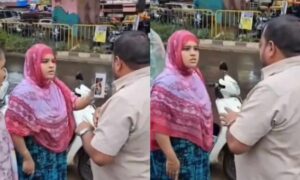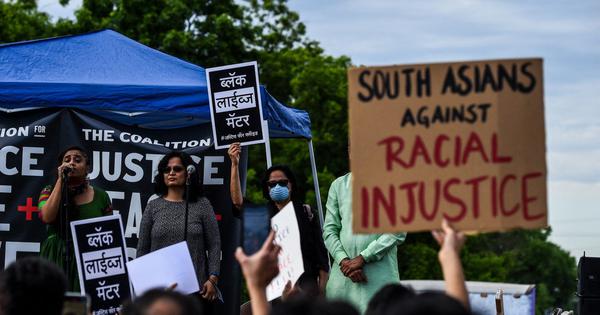
The tariff dispute between India and the United States, and outrage based on specific incidents such as an accident by a Sikh truck driver that left three dead in Florida, coincided with a spike in racist social media posts against Indians, according to a study by Washington-based think tank Center for the Study of Organized Hate.
The study, released on Tuesday, analysed 5,124 posts targeting Indians on the social media platform X between July 1 and September 7. Of these, 680 high-engagement racist posts had 281 million views. One hundred and twenty-one of these posts had used anti-Indian slurs and drawn 74 million views.
Narratives framing Indians as “invaders” and “job thieves”, alongside calls to deport Indians, accounted for 474 posts and 111 million views during the period in which the study was conducted.
This makes immigration and deportation-themed rhetoric the primary driver of engagement, according to the study.
The increase in online hate during this period indicates that news and policy tensions act as “predictable accelerants of racist content”, the study found.
The diplomatic ties between New Delhi and Washington have been strained in recent months.
US President Donald Trump has repeatedly claimed that he mediated the ceasefire between New Delhi and Islamabad in May, and imposed so-called reciprocal tariffs and punitive levies on India for purchasing Russian oil amid the Ukraine war.
New Delhi has rejected the claims, maintaining that the ceasefire was reached bilaterally. It has also said that Trump’s punitive levies “for actions that several other countries are also taking in their own national interest” were “extremely unfortunate”.
The study observed that, considering political compulsions and “the leanings of their respective domestic support base”, neither Trump nor Prime Minister Narendra Modi had “appeared inclined to back down from their positions”.
The consequent bilateral tensions “led to a ramping up of nationalistic rhetoric on both legacy media and social media in India, while also providing fuel for anti-Indian sentiment on social media in the US”.
The Center for the Study of Organized Hate noted that online hate had serious consequences for minorities. The narratives were emboldening far-right groups, “exponentially increasing the threat of violence” and leading to physical harm against minorities.
Amplification of racism against Indians on social media had manifested itself in attacks against the community in Ireland, said the think tank. There was a series of attacks on Indians in the country in July and August.
Specific incidents are also exploited by bad-faith actors to amplify racism against communities, the study said, citing the death of three persons in Florida on August 12 after a Sikh trucker made an allegedly illegal U-turn on a road.
The event triggered a spike in the harassment and online abuse of the Sikh and the Indian communities in the US, the study found.
“The allegation that [the driver] had entered the US illegally likely bolstered the already strong currents of anti-migrant and anti-Indian discourse on social media,” it added.
The 680 posts on X that got 281 million views mainly revolved around themes such as deportations, “invasion” and “job theft”. The other themes were slurs, mockery and casual abuse, incident-driven narratives of hate and racism, as well as “general anti-India hate”.
Online hate was also destroying civil discourse among communities, the centre noted.
The Center for the Study of Organized Hate said that the increase in anti-Indian racism on X since January could be viewed in the context of global backlash against migrants and domestic trends.
Anti-Indian hate could also be situated within the broader landscape of anti-South Asian and anti-Asian racism in the United States. “Although it targets a range of Indian and South Asian groups, it makes no distinction between Indians and other South Asians, between Hindus, Muslims, Sikhs and other Indian communities, or between Indian citizens and non-citizens,” the study found.
Indians were being targeted online and offline not only for being Indians but also Muslims, Sikhs, migrants, or more broadly, as people of colour, the study added.
Anger in some American groups against the H-1B visa programme is another source of anti-Indian racism in the US.
The H-1B visa is a non-immigrant visa that allows companies in the United States to temporarily employ foreign workers for special occupations.
In the past few years, Indians have constituted the majority of H-1B visa holders in the United States. Indians comprised 72.3% of all H-1B visas issued by the United States in fiscal year 2023.
In early January, the Center for the Study of Organized Hate had said that racism and xenophobia against Indians had surged on X after Sriram Krishnan, a technology expert of Indian origin was named Trump’s advisor on artificial intelligence. Trump was the US president-elect at the time.
The study in January also said the posts that were analysed violated X’s content policies on hateful conduct. Despite this, the social media platform had not adequately acted against such posts, it noted.
📰 Crime Today News is proudly sponsored by DRYFRUIT & CO – A Brand by eFabby Global LLC
Design & Developed by Yes Mom Hosting


